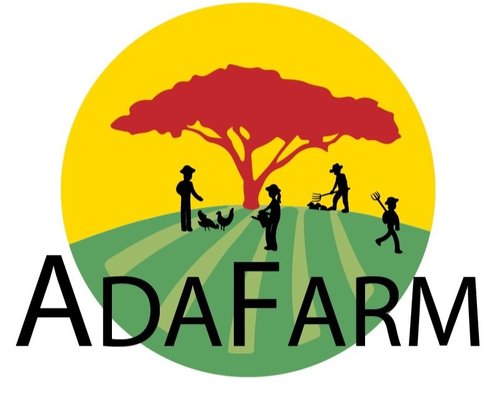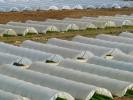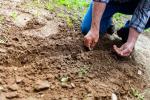
H2020 ADAFARM Project: Sustainable adaptation strategies for smallholder farmers to climate change based on ecosystem services
- Type Project
- Status Filled
- Execution 2018 -2020
- Assigned Budget 170.121,6 €
- Scope Europeo
- Main source of financing Horizon 2020
- Project website ADAFARM
Regarding the project's first objective, regarding access to agricultural information sources, there are significant territorial differences within the country. In areas far from the capital, where poverty is most acute, access to information sources is very limited and intermittent. In areas close to the capital, however, more families have access to radio, television, and even mobile phones or smartphones. Specifically in the agricultural field, agricultural extension services are the most important source of information. Agricultural extension services involve sending government personnel to different rural communities to provide support on agricultural issues and, ideally, in other areas related to the community's quality of life. The goal is to extend these practices to territories that have not had them until now, which is difficult due to the government's very limited resources. This study is considered very beneficial in encouraging information to reach the appropriate channels, which will enhance its usefulness. The fundamental conclusion is that all sources of information are important for the transmission of different types of information: agricultural extension services primarily transmit technical information about agriculture, while radio broadcasts general and meteorological information. Similarly, as television becomes more widespread, certain information programs can motivate the adoption of certain agricultural strategies that are positive for rural communities. Regarding the objective of the SECONF, related to the episodes of hunger suffered by small rural communities, based on the data already analyzed, it is concluded that these are mainly due to droughts and floods, with very limited impact on other factors. The most vulnerable families are very young families, very old families, or families with one parent missing, which are mostly female-headed families. The most common solutions applied are: simply reducing food intake (or eating lower-quality foods), resorting to loans from family or friends, or trying to find resources in the forest (roots, fruits, etc.). Having a high proportion of forest cover significantly increases the chances of being able to use natural resources to cope with a food shortage crisis. Natural resources are used in the form of food (from fruits, hunting, gathering, and fishing) or materials used to earn money to buy food. The materials can be processed (furniture, tools, charcoal, bricks) or unprocessed (sticks, straw, etc.). Regarding transferability, the project is highly transferable to other territories with similar problems, both in terms of its approach and the actions developed. The objective is also to create an online course based on the project results so that people working with local communities in Mozambique can receive more specific training on climate change and adaptation strategies. Interview during ADAPFARM fieldwork
The ADAFARM project began in October 2018 and ended in November 2020. One of the project's objectives was to investigate the access and sharing of information among smallholder farmers in Mozambique, with the goal of improving their access to information for climate change adaptation. To this end, different methods were implemented to collect data and gather stakeholder knowledge. Specifically, data were collected through interviews, focus groups, and questionnaires focused on the four study areas, and then combined with statistical and qualitative analyses.
Data were collected using a variety of data collection methods, including: a) a survey of 100 smallholder rural farmers; b) interviews with nine stakeholders (government officials and NGO technicians); and c) nine focus group discussions with local communities and other stakeholders. The results were presented at an international online conference and will be published in a peer-reviewed research article.
The second objective was to analyze the importance of formal and informal institutions and factors such as poverty and gender in the use and application of climate change adaptation strategies. This task was carried out through data analysis (survey data from 1,635 households in the ACES project) using logistic models (regression analysis) and R software. Interesting results were obtained and are included in ongoing research projects. The results have been disseminated through various channels, including:
- https://www.icatalist.eu/adafarm
- Blog posts: https://www.icatalist.eu/blog-icatalist
- https://www.youtube.com/watch?v=4FmsNEQr1g0
- https://ec.europa.eu/spain/news/20191011_%20Research-EU-How-the-EU-supports-innovation-and-research_es
- Master's Thesis completed by a student at the Autonomous University of Madrid within the framework of ADAFARM. Title: "Adaptation to climate change and mitigation of its effects on agriculture in Mozambique: review of projects and measures." June 2020.
- https://www.madrimasd.org/lanochedelosinvestigadores/actividad/madrid-investiga-emprende-diviertete
- Presentations at the Biennial Stakeholder Conference on Climate-Smart Agriculture in Africa (ISBN: 978-9988-8373-3 – 4. 1-2 December 2020): - Information sharing for climate change adaptation: smallholder farmers in Mozambique. Zorrilla-Miras, P., Sá N. Lisboa, Elena López-Gunn, Luis Artur, Almeida Sitoe, Raffaele Giordano. - Towards a framework for the global stocktake of adaptation. Insights from stakeholder consultations and the review of climate ambitions of 50 African countries. Nowak, A., Pedro Zorrilla-Miras, Noelia Zafra-Calvo, Lucy Njuguna, María José-Sanz, Elena López-Gunn, Sanjay Vashist, Mozaharul Alam, Chinwe Speranza, Todd S. Rosenstock, Erick Omollo, George Wamukoya. 2020.
Sub-Saharan Africa has a high proportion of poor people (42%), conserves a high concentration of biodiversity (20% of the world's biodiversity hotspots) and faces high rates of deforestation and ecosystem degradation.
Smallholder farmers in sub-Saharan Africa exposed to climate hazards are some of the most vulnerable groups in the world. Therefore, there is an urgent and critical need to find sustainable, nature-based rural development strategies that are resilient to climate change and enable people to escape poverty by conserving and protecting the best possible natural environment. In this context, ADAFARM seeks robust evidence of the impact of different strategies for adapting to climate change and increasing the benefits that rural people obtain from nature in Mozambique.
Although ADAFARM is based, in part, on data collected in a previous project (ACES), it also includes a significant amount of new data collection. Therefore, from the outset, a theoretical division was made into two parts: one based on previously collected information and the other based on newly generated data. The goal is to share the findings with the Mozambican government, NGOs, and universities so they can orient their strategies and policies in the direction indicated by the results, as well as provide rural communities with the information they need on health, agricultural, legal, and other matters.
ADAFARM aims to analyze ecosystem-based climate adaptation options and nature-based solutions for smallholder farmers in sub-Saharan Africa. In line with the SDGs, these strategies would be economically efficient, environmentally sustainable, and socially equitable. I will use a socio-ecological framework to focus on the role played by formal and informal institutions and key factors such as poverty and gender for ecosystem-based climate change adaptation strategies.
I will draw on data, results, and stakeholder networks from the ACES project. ACES was a three-year research project funded by the UK government (€2 million) that aimed to analyze the consequences of ecosystem service loss from deforestation on the livelihoods of poor rural communities.
I will further analyze data from a survey of over 1,600 households through a new lens: the adaptation of smallholder farmers (especially female-headed households) to climate change, and in particular, the role of institutions. To complete the research, I will conduct further qualitative data collection, through interviews and focus groups, to further develop our understanding of climate change adaptation options for smallholder farmers.
I am currently working at ICATALIST, an innovative SME specializing in knowledge brokerage, applied research, and capacity development related to socio-ecological systems and climate change adaptation. Working at ICATALIST will eventually allow me to transfer and scale the project to other areas with real and plausible interventions to design and help implement adaptation strategies to improve smallholder farmers' resilience. ICATALIST aims to play a leading role in the climate change adaptation policy space, with viable financing solutions for development (and therefore the SDGs). This project will provide in-depth knowledge and approaches to help governments and interested organizations develop climate adaptation strategies that ultimately benefit smallholder farmers' livelihoods.
The EU-funded ADAFARM project analyzed sustainable climate adaptation options for smallholder farmers in Mozambique, Southeast Africa.
The research was carried out with support from the Marie Skodowska-Curie Actions program. "We focused on the role played by formal and informal institutions and on key factors such as poverty and gender," says researcher Pedro Zorrilla Miras.
The project's initial work focused on climate-related hunger episodes experienced by small rural communities in remote areas. "Our goal was to determine the importance of ecosystems as a coping strategy in these situations, and the different opportunities for farmers depending on the forest cover within their communities," he explains.
In a second phase, the researchers investigated how the Mozambican government and NGOs can improve communication with farmers and how information can reach rural communities more effectively. "Specifically, we investigated the access and sharing of information among smallholder farmers in Mozambique to improve their access to information for climate change adaptation," notes Zorrilla Miras.
Causes of hunger. Results related to hunger episodes experienced by small rural communities showed that more than 80% of cases are due to climatic hazards such as droughts and floods, compared to other factors such as land scarcity, lack of agricultural inputs, and pests. Zorrilla Miras notes: "The most vulnerable families are those headed by women; related factors include limited access to health and extension services, as well as low savings levels."
The most common strategies for finding new food sources included borrowing from family or friends, consuming seeds stored for the next growing season, informal work, and forest food and resources. Access to a local market was also found to increase the use of natural resources.
Access to information. The second set of results, related to access to agricultural information sources, revealed significant territorial differences. According to Zorrilla Miras, "In rural areas far from the national capital, where poverty rates are higher, access to information sources is very limited and intermittent." Therefore, the use of small solar panels by small rural farmers in Mozambique could be a disruptive technology for the future. "They increase the usability of mobile phones and smartphones, increasing the sharing of local knowledge and promoting major technological and social changes," he adds.
Significant gender differences have also been found in the use of information sources. Women make greater use of oral, direct, and informal communications within their communities, while men rely more on radio and telephone. Illiteracy rates among women are also higher than those among men and represent a greater barrier to accessing new information than for men.
ADAFARM identified that the most important sources of information for farmers are agricultural extension services, which consist of government personnel working in direct contact with rural communities. "However, this is difficult due to limited government resources," says Zorrilla Miras. "Ideally, they would support actors and activities related not only to agriculture but also to community quality of life, such as local organization, natural resource management, etc."
These findings will be shared with the Mozambican government, NGOs, universities, and all other stakeholders working on these issues to guide and inform their strategies and policies. "Ultimately, the beneficiaries will be rural farmers and ecosystem conservation," concludes Zorrilla Miras.
- I-CATALIST SL (ICATALIST)







